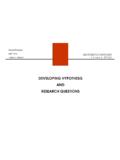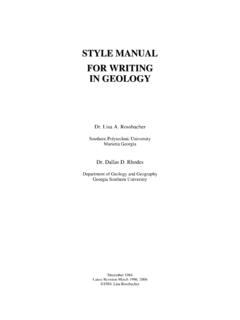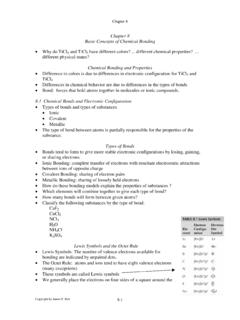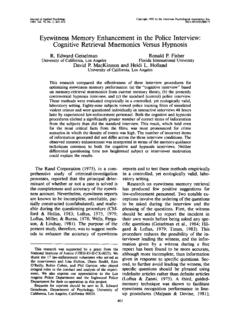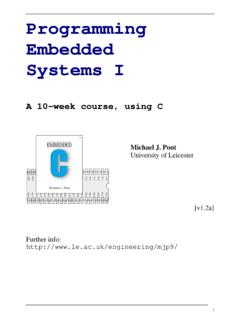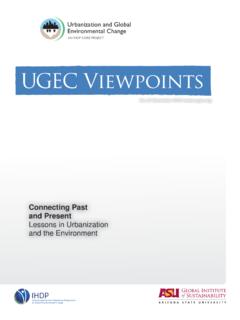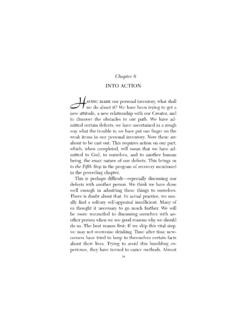Transcription of What are our options? - Arizona State University
1 Draft of 6/12/2012. Please do not quote without permission. Comments sent to are most welcome. what are our options ? DOUGLAS W. PORTMORE. ABSTRACT: We ought to perform our best option that is, the option that we have most reason, all things considered, to perform. This is perhaps the most fundamental and least controversial of all normative principles concerning action . Yet, it is not, I believe, well understood. For even setting aside questions about what our reasons are and about how best to formulate the principle, there is a question about how we should construe our This question is of the utmost importance, for which option will count as best depends on how broadly or narrowly our options are to be construed.
2 In this paper, I argue that an agent's options at a time, t, are all and only those actions (or sets of actions) that are scrupulously securable by her at t. WE OUGHT TO do our best. That is, we ought to perform our best option. By best option', I don't mean the option that would produce the best outcome. The idea that we ought to do what would produce the best outcome is quite controversial. Instead, I mean something much less controversial: we ought to perform the option that we have most reason (all things considered) to Of course, there could be more than one option that's tied for first-place. So, to be a bit more careful, I should say that we ought to perform one of the options that we have optimal reason to perform.
3 1 I address the issue of how best to formulate the principle in a companion paper entitled Perform Your Best Option (2011b). Both this paper and its companion are descendants of a now defunct paper entitled Doing Our Best, which is cited in Portmore 2011a. In a separate paper, I address the issue of what our reasons are see Portmore 2011c. 2 Throughout, I'll be concerned, not with what agents morally ought to do or with what agents prudentially ought to do, but with what agents ought to do, all things considered. Moreover, I'll be concerned with only what agents objectively ought (or are permitted or are obligated) to do that is, with what they ought (or are permitted or are obligated) to do given what the relevant reason-constituting facts about their choice situation happen to be, and so irrespective both of what they take those facts to be and of what their evidence suggests that those facts might be.
4 And when I talk about reasons, I'll be talking about objective reasons these are facts that count in favor of an agent's performing a given action irrespective of her beliefs or evidence. For instance, the fact that there will be dancing at the party constitutes a reason for Ronnie, who enjoys dancing, to attend the party regardless of whether or not he believes, or has any reason to believe, that there will be dancing at the party (Schroeder 2007). For more on these distinctions, see Portmore 2011a, pp. 12 23. 2. Now, the word optimal' is a comparative term. To say that an agent has optimal reason to perform a given option is to say that there is no alternative option that she has more reason to perform. But what are the agent's options ?
5 There seem to be a number of ways that we might construe an agent's options : those actions that it is logically possible for her to perform, those actions that it is physically possible for her to perform, those actions that it is personally possible for her to perform, For now, though, let me sidestep the issue by stipulating that I'll use the term x options ' to stand for whatever the relevant options are. That is, we are to substitute for x' (perhaps, personally possible') whatever would make the following maximally plausible: PYBxO A subject, S, is permitted at t to perform an action , , at t if and only if (and because) -ing at t is an x option for S at t and there is no other action that is an x option for S at t that S has more reason to perform (t < t ).
6 I call this PYBxO (pronounced: PAHY-biks-oh), because it implies that you are obligated to perform your best x option that is, the action that, of all your x options , is the one that you have most reason to According to PYBxO, what an agent can be obligated to do is constrained by what her x options are. If her -ing isn't an x option, then she can't be obligated to . But what was once an x option for an agent may no longer be one. To illustrate, imagine that, last week, Jane had the x option of enlisting in either the Army or the Navy. But now that she has enlisted in the Army, she no longer has the x option of enlisting in the Navy, for she can't enlist in the Navy if she's already enlisted in the Army. (Assume, for now, that is an x option for S only if S can.)
7 And if her x options can change over time, then so too can her obligations at least, if PYBxO is true. Suppose, for instance, that Jane had promised her father a month ago that she would enlist in the Navy on her birthday, which is today. A month ago, then, she had an obligation to enlist in the Navy on her birthday. But, as of yesterday, when she enlisted in the Army, she no longer has the x option of enlisting in the Navy. Thus, she no longer has an obligation to do so. Of course, she may have an obligation to apologize to her father for breaking her promise. But she cannot now be obligated to do what isn't even an x option for her at least, not if PYBxO is true. This means that, if we're 3 I borrow the term personally possible' from Zimmerman 2007, and I define it in section 3 below.
8 4 It implies this, for S is obligated to if and only if -ing is S's only permissible x option. 3. careful, we should, as I've done above, make explicit the relevant temporal indices when formulating PYBxO. If it seems strange to you to talk about permissions and options that are indexed to times, then think of them as I do: as properties that are possessed by the agent at certain times. Thus, you can think of the phrase S is permitted at t to at t as equivalent to the phrase S has at t the property of being permitted to at t . And, likewise, you can think of the phrase -ing at t is an option for S at t as equivalent to the phrase S has at t the property of having -ing at t as an option. Call the first sort of property a deontic property and the latter, an option property.
9 Clearly, people's option properties can change over time. And, given PYBxO, so must their deontic properties. In this paper, I'll address the issue of how we should construe an agent's x options so as to make PYBxO maximally plausible. This will involve three steps. First, in section 1, I'll explain how deontic principles differ from evaluative principles. Second, in section 2, I'll specify three conditions that a deontic principle (such as PYBxO) must meet in order to be plausible. Third, in section 3, I'll consider various alternative proposals for what we might substitute for x and assess the resulting versions of PYBxO according to the conditions specified in section 2. The upshot will be that we should construe an agent's x options at t to be all and only those actions (or sets of actions) that are scrupulously securable by her at t.
10 That is, we should substitute scrupulously securable' for x' in PYBxO. and arrive at PYBSSO (PAHY-bis-soh): the view that you ought to perform your best scrupulously securable option. In section 4, I'll argue that PYBSSO is just right in that it construes our options neither too broadly nor too narrowly. Lastly, in section 5, I'll address some potentially problematic cases for PYBSSO. 1. Deontic vs. Evaluative Principles For each way of construing an agent's options , there is a different version of PYBxO. That is, we get a different version of PYBxO depending on what we substitute for x' in the above schema. For instance, if we construe an agent's options as consisting in all and only those acts that are logically possible, thereby substituting logically possible' for x' in the above schema, we get a version of PYBxO that holds that you ought to perform your best logically possible option ( , PYBLPO' PAHY-blip-oh).


